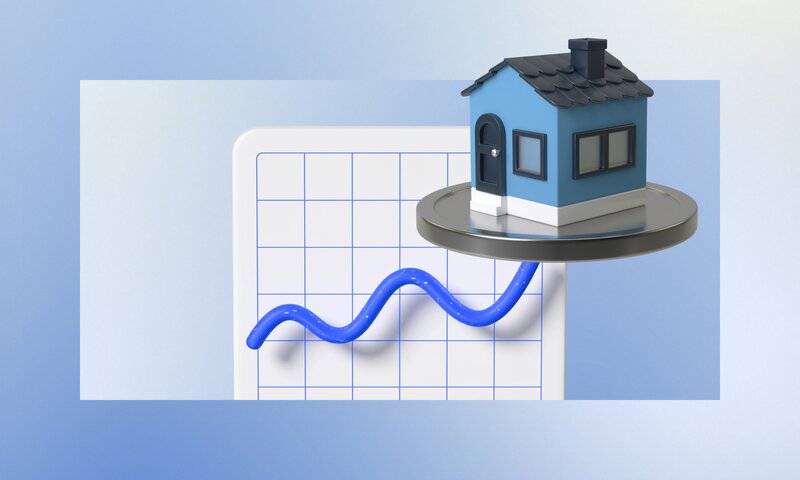What is Arrived Valuation?
Arrived Valuation gives investors a view of how the estimated market value of an investment changes over time. This feature allows you to monitor your real estate investments, much like you would track the unrealized gains in a stock portfolio.
Arrived Valuation - Property Value + Assets and Liabilities
Arrived Valuation represents our best estimate of the current value of each share. It is calculated using the estimated market value of the underlying asset, along with the LLC’s overall financial position, including cash reserves, outstanding loans, and amortized expenses.
This method is designed to provide you with a clearer picture of your investment’s current value, rather than a projection of future performance.
It’s common to see initial declines due to upfront expenses, such as property improvements and closing costs—but over time, long-term returns are driven by property appreciation and rental income.
The Arrived Valuation is not a realized or sellable price—it’s a snapshot designed to help you estimate the value your shares over time. Your actual return will ultimately depend on the asset's value at the end of the hold period, or the price you receive if you sell your shares through the Arrived Secondary Market (when available).
How do we calculate Arrived Valuations?
Starting 12 months after a property’s initial offering, we update the Arrived Valuation every quarter using the following inputs:
Property value estimates
We employ a hybrid approach to estimating the market value of each property.
- Comparable sales-based valuation
- Income-based valuations using investor cap rates
This dual-method approach creates a more balanced and realistic snapshot of value, especially for long-term rental assets. You can also track property values as a metric on your Portfolio Page.
Manual data review
Arrived’s Investments team manually reviews valuation data each quarter to remove outliers, correct anomalies, and ensure consistency across properties and markets.
LLC balance sheet updates
Arrived Valuation also factors in:
- Cash reserves
- Outstanding liabilities (e.g., loan balances, accrued taxes)
- Asset updates related to operational income and expenses
Customized amortization of expenses
Upfront expenses—like closing costs, renovations, and furnishings—are amortized based on their actual useful life. For example:
- A new roof may be amortized over 15–20 years
- A furniture package may be amortized over a 5-year period.
This schedule replaces our previous flat 5-year approach and aligns more closely with how institutional real estate portfolios manage costs.
Disposition costs removed
Previously, we have included estimated disposition costs—such as agent commissions and closing fees, to reflect the potential net proceeds if a home were sold. However, investors told us that this approach was confusing and did not align with how they think about current value.
So we’ve updated our methodology: Arrived Valuation now reflects the property's estimated value before any sales-related costs. This change provides a clearer picture of what your investment is worth today, without relying on assumptions about potential future sales.
We will continue to work on reducing exit costs; however, they no longer impact your current valuation.
Hold period assumptions
While this doesn’t change the Arrived Valuation math today, it will influence how we plan future investments:
- Financed properties: estimated hold aligns with mortgage fixed-rate terms (5, 7, or 10 years)
- Unfinanced properties: estimated hold = 5–15 years
- Fund portfolios: estimated hold = 5–20 years
How to use Arrived Valuation as an investor
Arrived Valuation helps you:
- Track property-level value changes over time
- Understand the equity portion of your investment
- Compare long-term performance across markets and asset types
You can view up-to-date valuations and historical data on your Portfolio Page or the Historical Performance page.
Why might Arrived Valuations decline?
It’s not uncommon for an Arrived Valuation to fall below the initial $10/share, especially in the early stages of ownership. This can happen for a few reasons:
- Lower cash reserves due to maintenance, vacancy, or loan servicing
- Initial property improvements or renovation expenses
- Market-based declines in third-party property value estimates
- Prorated impact of upfront investment fees
These early costs are temporary. Over time, property appreciation and rental income are expected to drive long-term returns.
Diversification & market performance
Valuations can also reveal performance trends across:
- Geographies (some markets favor appreciation, others favor income)
- Property types (performance timelines and cost structures differ)
- Asset strategies (e.g., single family residential properties vs. real estate-backed debt)
Investors can leverage this data to make informed decisions about diversifying across a range of properties, markets, and asset categories.









